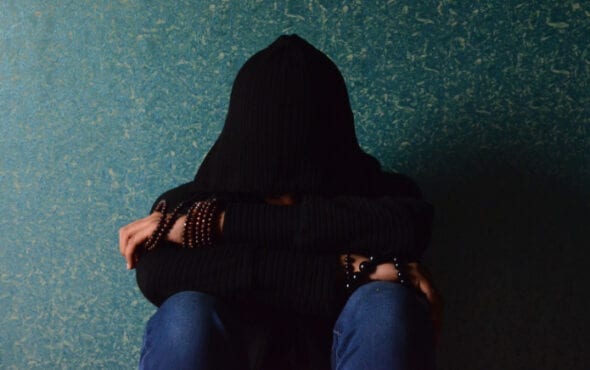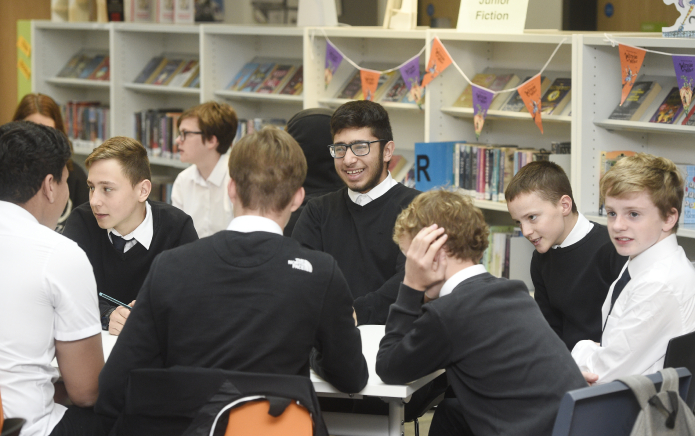
Just Like Us has released their full report on LGBTQ+ inclusion in schools.
Conducted by Cibyl on behalf of the LGBTQ+ young people’s charity, the independent research surveyed 2,934 pupils aged 11-18 (1,140 of whom are LGBTQ+) across 375 schools and institutions in the UK.
The research covered anti-LGBTQ+ bullying, wellbeing, sexual harassment, mental health, the struggles of coming out and more. Honestly, the results are quite harrowing and proves that growing up LGBTQ+ in the UK, in 2021, is still extremely tough.
According to their data, 42% of LGBTQ+ school pupils have been bullied in the past year, double the number of non-LGBTQ+ pupils (21%). One in five (18%) LGBTQ+ pupils also said they’ve never told anyone about being bullied, and just 21% informed a teacher.
Only 33% of LGBTQ+ pupils said there’s a clear system in place for reporting anti-LGBTQ+ bullying in their school.
Sadly, students who have come out as LGBTQ+ are still more likely to be bullied. As an example, 14% of LGBTQ+ students who aren’t out as queer said they’ve been a victim of biphobic bullying, which doubles to 28% for pupils who have come out.
The study, ‘Growing Up LGBT+’, also discovered that only 40% of LGBTQ+ staff are out to their pupils, “signalling that the majority of LGBTQ+ teachers feel forced into hiding who they are, their families or who they are married to at work.”
Also, students whose schools had “strong positive messages” about being LGBTQ+ had reduced suicidal thoughts or feelings. 74% of LGBTQ+ students who said their school doesn’t have positive messaging have contemplated suicide.
This number drops to 65% when their school boasts positive messaging about being LGBTQ+.
This also benefits non-LGBTQ+ students, with 33% who have never had positive messaging at school admitting to have contemplated suicide. Again, this number drops to 28% when there is.
Alarmingly, LGBTQ+ students are twice as likely to contemplate suicide and Black LGBTQ+ youth are three times more likely.
LGBTQ+ students are three times more likely to experience sexual harassment too, with 7% admitting they’ve experienced unwanted sexual attraction – including 12% of bisexual girls – compared to 2% of non-LGBTQ+ pupils.
You can download Just Like Us’ full report on LGBTQ+ inclusion in schools here.
Speaking with Just Like Us, a Year 12 bisexual student from the South West said “literally any” LGBTQ+ inclusive education initiatives would benefit them as they “just need to be able to express” themselves at school.
“There is nothing at my school that makes a positive difference to my life,” they said. “It’s almost as if the government practically forbids schools to teach about LGBTQIA+ and our struggles.”
When asked what would help them most at school, a Year 13 pupil from the North West responded: “I would love to have support for staff to come out but not forced to come out. Teenage boys are scary and it could be unsafe.”
Dominic Arnall, Chief Executive of Just Like Us, is calling for all schools and institutions to better demonstrate their alliance to the LGBTQ+ community and to reassure students of their safety.

“Our report, conducted independently by Cibyl, into the experiences of LGBT+ young people growing up in the UK in 2021 has revealed some horrifying news,” said Arnall.
“LGBT+ pupils are twice as likely to be bullied and contemplate suicide but the good news is that schools with an inclusive culture also see a reduction in pupils’ suicidal thoughts and feelings, and have a positive impact on all pupils’ mental health, regardless of whether they are LGBT+ or not.
“We are really concerned too by the high number of LGBT+ school staff members who feel they have to hide who they are, their families or who they’re married to in their jobs, and it is awful to see that Section 28 continues to have a knock-on effect on school staff in 2021.
“The independent research undoubtedly shows that LGBT+ pupils are disproportionately struggling but also shows that sending positive messages of LGBT+ acceptance goes hand-in-hand with positive outcomes for all pupils – School Diversity Week this 21-25 June is a fantastic way for schools to begin doing this.”
Richard Kaye, Head of International Public Affairs and member of the EMEA Diversity & Inclusion Council at J.P. Morgan, which sponsored the report, added: “We are proud to build on our collaboration with Just Like Us by sponsoring this latest piece of research commissioned by the charity to understand the impact of the COVID-19 pandemic on LGBT+ young people.
“The report makes for sombre reading and rightly calls for all of us to reflect on the significance of the challenges facing the youngest members of the LGBT+ community. Our hope is that these findings act as a clarion call for everyone involved in the care of LGBT+ young people, particularly schools and parents, to take action.”
Just Like Us runs School Diversity Week from 21-25 June. For more information about the LGBTQ+ charity, visit their website here.
Young LGBTQ+ young people affected by this story can reach out to Beat and Childline for mental health support on the following numbers:
-
Beat Youthline for under 18s: 0808 801 0711
-
Beat helpline for adults: 0808 801 0677
-
Childline for under 19s: 0800 1111
Schools can now sign up to take part in School Diversity week – for free – here. You’ll also receive a toolkit of resources.



